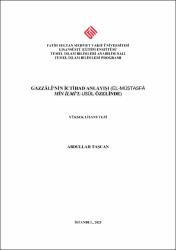| dc.contributor.advisor | Ateş, Üveys | |
| dc.contributor.author | Taşcan, Abdullah | |
| dc.date.accessioned | 2022-01-13T10:48:43Z | |
| dc.date.available | 2022-01-13T10:48:43Z | |
| dc.date.issued | 2021 | en_US |
| dc.identifier.citation | TAŞCAN, Abdullah, Gazzâlî’nin İctihad Anlayışı (El-Müstasfâ Min İlmi’l-Usûl Özelinde), Fatih Sultan Mehmet Vakıf Üniversitesi Lisansüstü Eğitim Enstitüsü Temel İslam Bilimleri Anabilim Dalı Temel İslam Bilimleri Programı,Yayımlanmamış Yüksek Lisans Tezi, İstanbul 2021. | en_US |
| dc.identifier.uri | https://hdl.handle.net/11352/4032 | |
| dc.description.abstract | Bu araştırmada; fıkıh usulü ilminde eser veren ulema arasında önemli bir yere sahip olan İmam Gazzâlî’nin ictihad konusu hakkındaki görüşleri, değerlendirmeleri, izah ve yaklaşımları ele alınmıştır. Araştırmada, Gazzâlî’nin fıkıh usulü alanında önemli bir yere sahip olan ‘’el-Müstasfâ min ʿilmi’l-usûl’’ adlı eserindeki ictihad nazariyesi yansıtılmaya çalışılmıştır. Ayrıca müellifin ictihad ile ilgili görüşleri hakkında yapılan bir takım tenkitler değerlendirilmiş ve yer yer gerekli cevaplar verilmeye çalışılmıştır.Gazzâlî, ictihad anlayışını ortaya koyarken diğer usulcüler gibi Kitap, sünnet ve icmâ delillerini kullanmıştır. Ancak bu delilleri kullanırken orijinal ictihad metodolojisini ortaya koymuş, yer yer diğer usulcülerden farklı olarak bazı ilkeler benimsemek suretiyle bunu ictihad nazariyesinde uygulamıştır. Söz gelimi, müellife göre dördüncü şer‘î delil istishâb delilidir ve müellif bunu akıl delili olarak da nitelemiştir. Öte yandan kıyası, şer‘î deliller arasında saymamıştır. Zira ona göre kıyas, şer‘î delillerden biri değil de hüküm çıkarma yollarından biridir. Ayrıca Gazzâlî, müctehidin bilmesi gereken şer‘î deliller arasında şer‘u men kablenâ, sahâbî kavlî, istihsan ve maslahat-ı mürseleyi saymamıştır. Nitekim bunları mevhûm asıllar olarak nitelemiş ve muteber bir delil olarak görmemiştir. Bunun yanı sıra yetkin ve muhakkik bir usulcü olan İmam Gazzâlî’nin ictihad nazariyesi incelendiğinde ictihad nazariyesinin teşekkülünde İmam Şafii, Basra Mu‘tezile ekolü, Ebu’l-Hasen el-Eş‘arî, Ebû Bekir el-Bâkıllânî ve İmâmü’l-Haremeyn el-Cüveynî’nin izleri görülmektedir. | en_US |
| dc.description.abstract | Abu Hamid al-Ghazali is one of the permanent scholars who have widely discussed independent reasoning (Ijtihad), one of the fundamental sources of Shari'ah law. This study envisages descriptively analyzing Ghazali's doctrine of ijtihad / independent reasoning through his famous scientific work al-Mustasfā min ‘ilm al-usul. In addition, the study examines al-Ghazali's critical opinions regarding independent reasoning/Ijtihad.Regarding the legitimacy, necessity, and importance of independent reasoning/ Ijtihad, Al-Ghazali presents shreds of evidence from the Qur'an and Sunnah, following the traditional approach of Muslim jurists. Yet, there are still some issues, where Al-Ghazali carries his own views and does not follow the traditional arguments. Therefore, it would be correct to say that while describing independent reasoning/ ijtihad, al-Ghazali has neither fully followed the tradition nor introduced a separate approach, rather, he has adopted a balanced approach between tradition and innovation. For example, discussing the sources of Shari'ah law, Al-Ghazali accepts presumption of continuity/ Istihaab as a permanent source, but, simultaneously, he does not recognise the independent reasoning/ Ijtihad as a permanent source of Shari'ah law, rather he considers it as a tool to infer Shari'ah provisions. Also, Ghazali does not recognise the revealed laws preceding the Shari'ah of Islam (Sharu man Qablana), the Fatwas and personal opinions of the companions of the prophet Muhammad- peace be upon him-, Equity of Islamic law, (Istihasan) and consideration of public interest (Maslaha Mursala) as authentic sources of Shari'ah law. According to Ghazali, these are presumed to be the source of law. In addition, according to the study, the flavour of the approaches of Shafi'i, Iraqi, more precisely Basrian Mu'tazilah school of thought, Ash'ari, Juwini, Abu Bakr Saghir and Baqlani has been reflecting in the Ghazali's technique of reasoning and approach of inference. | en_US |
| dc.language.iso | tur | en_US |
| dc.publisher | Fatih Sultan Mehmet Vakıf Üniversitesi, Lisansüstü Eğitim Enstitüsü | en_US |
| dc.rights | info:eu-repo/semantics/openAccess | en_US |
| dc.subject | Fıkıh Usulü | en_US |
| dc.subject | Gazzâlî | en_US |
| dc.subject | El-Müstasfâ | en_US |
| dc.subject | İctihad | en_US |
| dc.subject | Müctehid | en_US |
| dc.subject | Jurisprudential Method | en_US |
| dc.subject | Ghazali, al-Mustasfa | en_US |
| dc.subject | İndependent Reasoning/ Ljtihad | en_US |
| dc.subject | Mujtahid | en_US |
| dc.title | Gazzâlî’nin İctihad Anlayışı (El-Müstasfâ Min İlmi’l-Usûl Özelinde) | en_US |
| dc.title.alternative | Ghazali's Doctrine of İjtihad (Specific To Al-Mustasfa Min İlm Al-Usul) | en_US |
| dc.type | masterThesis | en_US |
| dc.contributor.department | FSM Vakıf Üniversitesi, Lisansüstü Eğitim Enstitüsü, Temel İslam Bilimleri Ana Bilim Dalı | en_US |
| dc.relation.publicationcategory | Tez | en_US |
| dc.contributor.institutionauthor | Taşcan, Abdullah | |



















